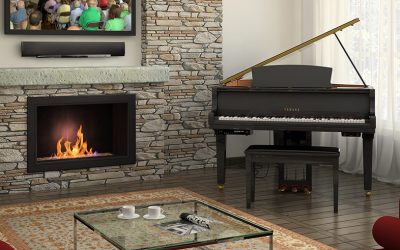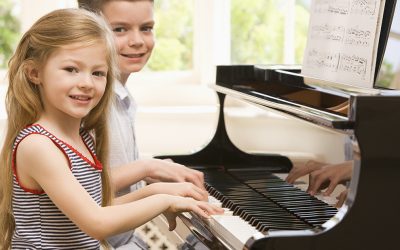There’s more than a price tag to look at when you’re considering purchasing a piano. This new fixture will undoubtedly bring music and joy into your home, but it comes with additional considerations such as future maintenance and your purpose of purchase. Think to yourself, ‘do I have the time or means to invest in a piano beyond its initial purchase price?’ Don’t make the mistake of making an impulse purchase and overlooking important details that will make your piano a beloved investment the family can enjoy for many years.
Why You Should Buy a Piano
If you’re considering a piano purchase, you’ve likely already fleshed out the reasons why you want to do so. Likely, someone in your family has just taken up lessons or is already a practiced musician and you want to have easy access to one of the world’s most beloved instruments. Think of the beautiful music that could be shared in your home, both with guests and other family members.
There are a lot of reasons to make a piano a permanent fixture in your home, but any long-term investment needs careful consideration. What other commitments are being made when you purchase a piano?
Digital vs. Acoustic: A Brief Introduction
Acoustic pianos are more traditional, and maybe the first thing that many people think of when a piano is mentioned. However, a digital piano stands well next to a piano. With weighted keys and the full range of 88 keys like a traditional piano, the main difference between acoustic and digital is the source of the sound: digital pianos playback recorded, authentic piano notes. Acoustic pianos have tiny hammers that hit steel strings, which reverberate notes.
Maintenance
Acoustic pianos require more in the way of maintenance than their digital counterparts. They need to be regularly tuned, cleaned, and kept in a dry, temperature-regulated environment (which is usually easy to maintain if the piano is kept in your home). It’s generally ideal to budget $300-$500 annually for acoustic piano maintenance with the understanding that the year’s maintenance costs may vary. Most of that money goes towards its tuning, but skipping that means your piano will need to be restrung sooner rather than later which is a significantly pricier service.
Water damage has the potential to completely kill a digital piano, but it can do significant damage to an acoustic piano as well. Consequences of water damage include glue failure, warping, and rusting and can ultimately lead to an unrecognizable instrument. Extremely humid environments can be dangerous for acoustic pianos, but digital pianos can withstand a little humidity.
Digital pianos aren’t significantly far behind in terms of necessary maintenance. They also need to be kept in a good climate, regularly dusted, and kept away from intrusive damage caused by pets, pests, or water. Most of their upkeep, however, is self-maintenance. If you do need to find a technician to look at your piano, most charge less than $50 to evaluate the damage.
Resale Value
It’s relevant to consider what might happen if you need to sell your instrument. While it’s typically not the end goal when a purchase is made, it’s a good idea to consider depreciation. Much like a car, use and age factor into this figure, and just like driving a car off the lot, a piano loses about 20% of its sticker price in value in the first year with a following 5% loss every subsequent year.
Digital pianos tend to depreciate much faster than acoustic. That’s mostly due to the fact that newer models of digital pianos are constantly released, with new features and upgrades that make them a more attractive alternative. In terms of longevity, they can last between 20-50 years, depending on their brand and upkeep. Acoustic pianos last an average of 40-50 years, but proper care often lasts more than 50 years. The material used to build the piano impacts longevity, too; a foam core build will depreciate much faster than a piano built with solid wood.
Specific brands can actually appreciate in value over time. High-quality brands like Steinway, Fazioli, Bosendorfer, and Yamaha have a reputation for holding their value over time. If well-maintained and in good condition, they may be worth as much or (in very rare cases) more than their original purchase price.
Brand Choice
Some brand names have developed a strong reputation for high-quality products. They’re trusted throughout the industry as reliable. A brand name may have a much higher price tag than its counterparts, but the longevity and high-quality sound production of their instruments make it worth the cost. Brands like Yamaha, Bösendorfer, C. Bechstein, are household names and are frequently found in “Best Buy” lists. Names to consider:
Top acoustic piano brands:
- C. Bechstein
- Blüthner
- Bösendorfer
- Fazioli
- Grotrian
- Sauter
- Shigeru Kawai
- Steinway & Sons (Hamburg)
- Steingraeber & Sohne
- Yamaha Pianos
Top digital piano brands:
- Yamaha Clavinova
- Casio
- Roland
- Kawai
- Korg
- Nord (Clavia)
- Dexibell
How It All Adds Up
Having a piano in your home is a beautiful way to connect and enjoy music in the now. The ability to create music and share it with your family will lead to memories that last a lifetime. A piano is a significant investment that will take time and money, but if music is a passion of yours, you’ll know that it’s worth it. All that’s left to do is find the right piano for you.
You may also be interested in...
Piano Sale – Up To $1000 Rebate on Select Yamaha Pianos!
Huge Piano Sale in Utah Going on Now - up to $1000 Rebate on 20+ Piano Models! This February, Piano Gallery is teaming up with Yamaha to provide HUGE rebates on new Yamaha Piano purchases. Receive up to $1000 rebate on select Yamaha pianos if purchased...
Digital Piano Vs. Acoustic Piano – What to Consider
When you're looking to buy a piano, you may be overwhelmed with options. Should you buy a new or used piano? What size of piano should you buy? What is the best piano brand in your price range? One of the most common questions we are asked is what the benefits are of...
Piano Terms, Sizes, & Styles
Acoustic Piano Acoustic pianos are traditional pianos that use metal strings, soundboards, and hammer to produce sound through vibration. Vertical Pianos Instead of strings resting horizontally as in a grand piano, vertical pianos have vertical soundboards and...

